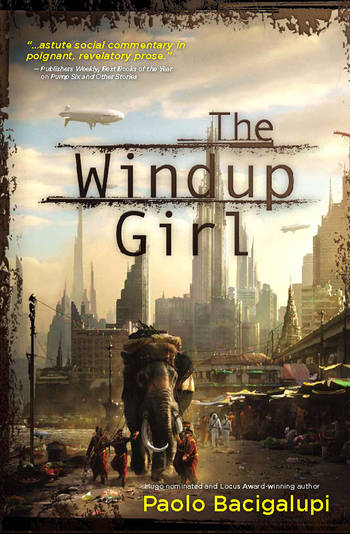The Latest from Boing Boing |  |
- MGMT: Andreas Nilsson vs. HP Lovecraft
- See you tonight at Seattle University Bookstore!
- Scotland Yard ignored Murdoch paper's royal voicemail hacks
- HOWTO defeat a sliding chain lock with a rubber band
- Shirky: What "people must pay for content" really means
- You may not be interested in iPad, but iPad is interested in you.
- 2010 Hugo Nominees announced
- 1984, iPad edition
- NPR on Slapp lawsuits
- iBooks naughty word filter doesn't let you say "sperm"
- Star Wars Sound Effects Quiz!
| MGMT: Andreas Nilsson vs. HP Lovecraft Posted: 05 Apr 2010 05:09 AM PDT Andreas Nilsson's positively Lovecraftian music video for MGMT's "Flash Delirium," from their new record Congratulations. (Thanks, Rodney Ascher!) Previously: |
| See you tonight at Seattle University Bookstore! Posted: 05 Apr 2010 04:55 AM PDT Reminder: I'll be at the Seattle University Bookstore tonight at 7PM, doing a panel and a signing with Mark Henry, Jeanne Stein, and Jaye Wells. Hope to see you there! |
| Scotland Yard ignored Murdoch paper's royal voicemail hacks Posted: 05 Apr 2010 04:46 AM PDT The Guardian newspaper reports that Scotland Yard ignored evidence that the News of the World newspaper hacked the voicemail of numerous public figures. While NotW was prosecuted for a handful of voicemail hacks, the police suppressed evidence that the paper had also invaded the privacy of members of the royal family and other prominent people. The editor of the paper at the time of the mass-scale bugging was Andy Coulson, now serving as media advisor to David Cameron, the leader of the UK Conservative party. Police 'ignored News of the World phone hacking evidence' (Thanks, Tom!) (Image: Slug from Atmosphere eavesdrops on Lucy?, a Creative Commons Attribution (2.0) image from joehowell's photostream) Previously: |
| HOWTO defeat a sliding chain lock with a rubber band Posted: 05 Apr 2010 04:37 AM PDT Sliding chain lock, meet rubber band. |
| Shirky: What "people must pay for content" really means Posted: 05 Apr 2010 04:31 AM PDT Clay Shirky's latest broadside, "The Collapse of Complex Business Models," is as incandescent as ever. It's a thoughtful and provocative piece on the way that "high quality" products (which are also complex and expensive) reach diminishing returns, where they are being made ever-more complex without any rise in value, because the institutions that made them don't know how to be less complex. It's a great commentary on walled gardens, paywalls, and the reflexive entertainment industry sneer that YouTube is made out of nothing but priceless pirated media and worthless videos of cats. The Collapse of Complex Business Models (Image: Learning from bridge collapses I-35W Minneapolis and Tacoma Narrows, a Creative Commons Attribution Share-Alike (2.0) image from goldenswamp's photostream) Previously:
|
| You may not be interested in iPad, but iPad is interested in you. Posted: 05 Apr 2010 03:18 AM PDT  Looking at the list of places that had iPads in early, you'll notice that most are owned by print mags or newspapers. Only one or two independent blogs got review loaners. "Why us?" is the obvious question, but it's the wrong one. The question that keeps coming back to me is "Why you?" Looking at the list of places that had iPads in early, you'll notice that most are owned by print mags or newspapers. Only one or two independent blogs got review loaners. "Why us?" is the obvious question, but it's the wrong one. The question that keeps coming back to me is "Why you?"But first, here's Fake Steve "Dan Lyons" Jobs on iPad reviews, as quoted by TechCrunch: [Apple's] head of PR told my predecessor, Steven Levy, to pass word to the powers that be at "Newsweek" that Apple wasn't happy with the idea that they were going to hire me. Yes, that happened. And Apple plays this game. I mean, notice who got iPads and who didn't get iPads. Notice who got access and who didn't. Adds TC's Devin Coldeway: "They have the press in the hollow of their hand, with the iPad more than ever." It's true that it picked Time over Newsweek. Shocker! But it also loaned one to The Root, one of WaPo/Newsweek's legion of sister publications, albeit with a distinctive editorial identity of its own. And, of course, to Boing Boing, despite our frequent criticism of Apple and its policies. Check out our archives; plenty of posts praise Apple or one of its products, but the majority don't. It's not just Cory and BBG, either, who lob darts at Cupertino. Xeni pokes them also, and links to negative coverage elsewhere. We even became a hotspot of the OSX netbook hacking scene for people who wanted easy advice on how to perform the EULA-busting installations. And we do our fair share of Apple-themed photoshops and other cheeky amusements, too. What, you think they don't know? There's nothing special or virtuous about this spectrum of coverage. A similar mix is characteristic of all the best tech blogs, including those that were 'snubbed' by Apple last week. If there's one thing I'll bet Engadget, Gizmodo, Techcrunch, Wired, Boing Boing, et al., all share in common, it's the fact that our mailboxes are chock full of people complaining about how much we love Apple--right by the ones complaining about how much we hate them. In any case, Apple's choice of who to give loaner iPads seems not to be influenced by what we've written in the past. It's a pitch, to audiences it hasn't yet won. It loaned early units to newspapers and mags not to entice their publishers into the App Store fold--they need no further convincing at this point--but because it wants their unconvinced audiences to buy iPad. A similar plan holds true here: vast and diverse as it is, the readership here includes an awful lot of tech-savvy culture hounds who don't follow the gadget scene too closely and are suspicious of Apple's policies, but who remain susceptible to the lure of new technology. And you win some and you lose some. But then there's the delicious thought that we haven't quite made up your minds. Our collective ambivalence is reflected in the comment threads, too! A few of you chewed out Apple's myriad corporate errors only to describe a simple design change--a 7" version of the iPad, for instance--with which it could still win you over. Apple is supremely self-confident in the quality of its work, and for all the talk of 'inner circles' it hasn't ever shown any interest in holding court for critics. There's no guarantee it'll offer us an early look next time unless it wants close attention from you--not us--again. We buy interesting but compromising products because we know they wouldn't be a threat to anything if there existed quality alternatives. This holds true for Apple's iPad because there's nothing else like it, even accepting truthful irrelevancies like "It's a giant iPod Touch" or "It can't do things a netbook can do." With the thing now in stores, you can go and see for yourself. But I do notice that writers often like to polish off their Apple coverage with neurotic biblical references that dissolve into bathos, and on that front I too can deliver! To understand the appeal of Apple's excellent gadgets, you don't need to ask true believers "whither thou goest?" every single damned time. You just need to point out "hither thou always art" and leave it at that. All the same, if you're tempted, you should wait for the version with cheap 3G. |
| Posted: 05 Apr 2010 04:49 AM PDT Congratulations to all the 2010 Hugo Nominees, including some favorites I've reviewed here: Robert Charles Wilson's Julian Comstock, Cherie Priest's Boneshaker, Ian McDonald's "Vishnu at the Cat Circus" (from Cyberabad Days) and Paolo Bacigalupi's The Windup Girl. 2010 Hugo Nominees Previously: |
| Posted: 04 Apr 2010 03:27 PM PDT |
| Posted: 04 Apr 2010 02:12 PM PDT Nazanin Rafsanjani of NPR's On The Media took a look at legislation aimed at curtailing SLAPP lawsuits -- the kind designed to silence critics rather than right wrongs. As we have some experience of this, I got to tell Rafsanjani all about our case for the segment. |
| iBooks naughty word filter doesn't let you say "sperm" Posted: 04 Apr 2010 01:39 PM PDT  Dean spotted that bowdlerization is afoot in the iPad's bookstore's selection of classic literature! This includes obvious candidates such as a certain Joseph Conrad classic. But ... sperm? Dean spotted that bowdlerization is afoot in the iPad's bookstore's selection of classic literature! This includes obvious candidates such as a certain Joseph Conrad classic. But ... sperm? |
| Posted: 04 Apr 2010 09:01 AM PDT  Photo: Stéfan Le Dû We've isolated some distinctive--and not-so-distinctive!--audio snippets from the Star Wars flicks. Think you can identify them all? After you take the quiz, come on back and let us know how well you did. And if you have an idea for a future quiz, tell us your suggestion! Photo: Stéfan Le Dû We've isolated some distinctive--and not-so-distinctive!--audio snippets from the Star Wars flicks. Think you can identify them all? After you take the quiz, come on back and let us know how well you did. And if you have an idea for a future quiz, tell us your suggestion!
|
| You are subscribed to email updates from Boing Boing To stop receiving these emails, you may unsubscribe now. | Email delivery powered by Google |
| Google Inc., 20 West Kinzie, Chicago IL USA 60610 | |

 In a further blow to the official version of events, the Guardian has discovered that although police and prosecutors named only eight victims in court, material seized by police from Mulcaire and the paper's royal reporter, Clive Goodman, contained 4,332 names or partial names of people in whom the two men had an interest, 2,978 numbers or partial numbers for mobile phones and 30 audio tapes which appear to contain an unspecified number of recordings of voicemail messages.
In a further blow to the official version of events, the Guardian has discovered that although police and prosecutors named only eight victims in court, material seized by police from Mulcaire and the paper's royal reporter, Clive Goodman, contained 4,332 names or partial names of people in whom the two men had an interest, 2,978 numbers or partial numbers for mobile phones and 30 audio tapes which appear to contain an unspecified number of recordings of voicemail messages.  To pick a couple of examples more or less at random, last year Barry Diller of IAC said, of content available on the web, "It is not free, and is not going to be," Steve Brill of Journalism Online said that users "just need to get back into the habit of doing so [paying for content] online", and Rupert Murdoch of News Corp said "Web users will have to pay for what they watch and use."
To pick a couple of examples more or less at random, last year Barry Diller of IAC said, of content available on the web, "It is not free, and is not going to be," Steve Brill of Journalism Online said that users "just need to get back into the habit of doing so [paying for content] online", and Rupert Murdoch of News Corp said "Web users will have to pay for what they watch and use."  BEST NOVEL (699 nominating ballots) Boneshaker by Cherie Priest (Tor) The City & The City by China Miéville (Del Rey; Macmillan UK) Julian Comstock: A Story of 22nd-Century America by Robert Charles Wilson (Tor) Palimpsest by Catherynne M. Valente (Bantam Spectra) Wake by Robert J. Sawyer (Ace; Penguin; Gollancz; Analog) The Windup Girl by Paolo Bacigalupi (Night Shade)
BEST NOVEL (699 nominating ballots) Boneshaker by Cherie Priest (Tor) The City & The City by China Miéville (Del Rey; Macmillan UK) Julian Comstock: A Story of 22nd-Century America by Robert Charles Wilson (Tor) Palimpsest by Catherynne M. Valente (Bantam Spectra) Wake by Robert J. Sawyer (Ace; Penguin; Gollancz; Analog) The Windup Girl by Paolo Bacigalupi (Night Shade)
No comments:
Post a Comment